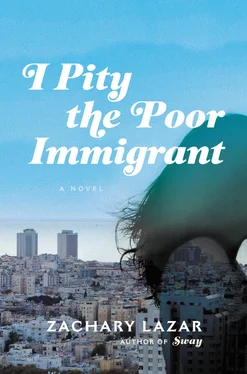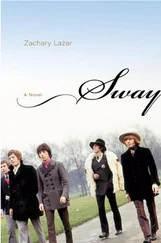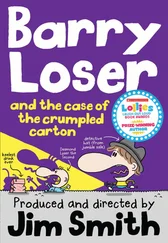
Rachel Kessler was more imposing than I expected — brown, almond-shaped eyes, short dark hair that spoke not just of practicality but of something more like renunciation. She’d been a dancer in her youth and had by all accounts been very beautiful, and you could still see this in the straight, somewhat clerical way she stood, the simple ease of her long oatmeal-colored sweater and her black soft-sided boots. It was the way my mother might have dressed if she were still alive, the way some women artists dress who are Rachel’s age. I knew by now that Rachel had grown up not in Israel but in Silver Spring, Maryland, that she had fallen in love with Israel and the idea of Israel on a college semester abroad in 1968. She was twenty-four when she married Bellen, twenty-five when they had Eliav, Rachel still a newcomer, an idealistic young woman who’d left behind a family and a stable life in the U.S. for an unfamiliar country in a state of permanent war. You can take an English-language tour now with Rachel Kessler through the various neighborhoods of Jerusalem, as well as tours of Masada, the Knesset, the Israel Museum, Yad Vashem. On my second day there, I went with her on a tour of Center City, including her own neighborhood, Talbiyeh, where she explained to her group that the Palestinian mansion we saw before us had been abandoned by its original owner only to fall into the care of a Jewish refugee, who’d painstakingly catalogued and stored the house’s contents in preparation for the owner’s return, though that owner had never returned, and so what could be done? I have seen the contents of such mansions for sale in the flea markets of Tel Aviv — even now you can buy the furniture and china and jewelry of Palestinians who fled in 1948—but I found myself unable to say anything contradictory to Rachel in front of that audience, unable because of the losses she herself has endured. It’s an interesting story, she’d said when I’d told her the long, complicated tale of Gila and me. Nowadays someone like Gila would be a businessperson. She’d be middle class. Maybe a real estate broker. That’s where the money is now, of course. She’d said this and I’d felt that my story, compared to the story of her and Bellen and Eliav, could only make her feel that I wasn’t a serious writer, that I was something else, perhaps something more like a member of the paparazzi.
On the afternoon after I followed her tour, we sat at a restaurant near my hotel and talked about Gila, Bellen, Eliav, Lansky, the odd connections between their disparate stories. We had discussed via e-mail the Hebrew word Gila had introduced me to, yored, its sense “of going down, of descending, of being corrupt.” I reminded Rachel now of the epigraph to Bellen’s essay “I Pity the Poor Immigrant,” in which the scholar Alan Fried writes of seeing the world through “the gangster’s eye,” the eye that views the world as divided into contrary groups of “wolves and lambs, predators and victims, winners and losers, deceivers and deceived.” I gathered that Bellen saw himself and Eliav through that lens while writing the piece and I wondered what Rachel thought about this.
“I’m sorry to keep reminding you of such unpleasant things,” I said when she didn’t answer at first.
She looked at her fingers on the stem of her glass of wine. “It’s not all unpleasant,” she said. “They were people I loved. Both of them, very much. In any case, you don’t have to remind me of those unpleasant things. They’re always there.”
What made it difficult to talk about all this, she told me, was what she could only describe as an uncanny element to the rift between Bellen and Eliav. They’d been at odds from the very beginning, she told me, the rift so fundamental that it seemed predetermined, genetic. Eliav was quiet, inward, watchful. Bellen was not exactly loud but he could be exuberant, even when he didn’t want to be. It was a side of himself he sometimes struggled to suppress in his writing, his South Tel Aviv boisterousness, his coarseness, and this, Rachel thought, was the basis of the problem between him and Eliav, even from the very beginning. Before Eliav could possibly understand any of this, he picked up on his father’s mild shame, intuited it somehow in his father’s posture, his occasional evasiveness or furtiveness. Bellen’s exuberance, which was much stronger than this shame, perversely made Eliav even more silent, more watchful — his father’s irreverence and gaiety seemed to embarrass or disappoint Eliav, who became quieter as he grew more aware of his own scorn.
“He was ten when David left,” Rachel went on. “But of course he knew it was coming — we both knew that. David couldn’t help himself, it was the way he was made. There were a lot of women. I didn’t like it, I was furious with him, but I loved him. I couldn’t help but love him. But Eliav was always there too, in the background, and he would have to witness the tension between us, no matter how much we tried to conceal it from him. It made David begin to move farther and farther away, not only because of me and my anger but because Eliav was always there, watching it all.”
It was a warm enough afternoon even in December that we were sitting on the porch beside a wall of gold-colored Jerusalem stone, surrounded by succulent plants and cacti, protected from the sun’s glare by white panels slung like sails from black cords above our heads. When the waitress brought our food, she wore a starched apron and a man’s dark necktie. It was not unlike the restaurant at which Gila and I had had lunch in New York the previous year, I told Rachel. The menu’s graphics were like something from New York — like something from anywhere, I realized. Roasted eggplant with sriracha remoulade, summer rolls with duck breast and avocado, endive salad with Sainte-Maure cheese. All over the world now, everywhere you go, there’s a restaurant that will know how to make the most of whatever is charming about its faded neighborhood and will present it in some understated, idiosyncratic way.
“The affairs made him paranoid and extreme,” Rachel said, speaking again of Bellen. “In his personal life, of course, but also in the way he saw the whole world. Because the world is also like this: a glass of white wine on a nice day. Even in Israel, it’s like this. I don’t think he ever really accepted that. In his imagination there was never any room for forgiveness, no room for healing. It bored him, my forgiveness. It was worse than that — it disgusted him. So eventually I had to stop trying to forgive him.”
I thought of the Ivan Schwebel painting that Bellen refers to in his Lansky essay, the image of King David’s first wife, Michal, confronting him on the street at night as in a Hollywood movie, “her eyes moist and accusing in the way of a betrayed woman.” He has indeed betrayed her and he will betray her further and in the picture both he and his first wife seem to already know this, Bellen wrote. I’m not comfortable when people cry, particularly people I don’t know, in a public place in a foreign country. I guess no one is comfortable with it. Touch her hand, I told myself. Say you’re sorry. I did these things, and Rachel smirked as she kept sniffling, ashamed of herself.
“Eliav hardly inherited anything from David,” she said then. “But I think it upset him to take what little there was. It will sound simplistic, but I think taking that money was what led to his relapse, his overdose. It took a long time, almost three years, but I think that was the root of it.”
For everything man does has significance. An evil act will generally cause some disruption or negative reaction in the vast system of the Sefirot; and a good act, correct or raise things to a higher level. Each of the reactions extends out into all of the worlds and comes back into our own, back upon ourselves, in one form or another.
Читать дальше













